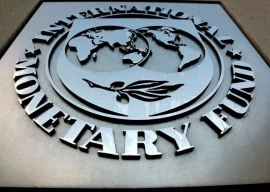
WASHINGTON: Chairman of the House Intelligence Committee and Republican Congressman Mike Rogers said, on Friday, that the United States should not end ties with Pakistan. However, he said, unilateral action in the country by the US should not be ruled out.
Addressing an event held by the conservative think tank, The American Enterprise Institute, Representative Rogers said that unilateral action should not be taken off the table when it comes to US’ national security interests.
“An example of that would be the Osama Bin Laden raid. I’m not saying that’s going to happen again but I’m just saying that you cannot take it off the table, you cannot tell them that no we won’t ever do that again. We should do what keeps American’s national security interests alive and well, we hope we don’t have to get to do that, we’d like them to be better partners, but at the end of the day we need to keep all of our options open.”
Rogers stressed on the importance of engagement with the country, and criticized the Congress for threatening to cut off aid to Pakistan. “If we don’t engage in Pakistan, I guarantee you, it will get worse.” He added that the relationship with Pakistan is one that the US cannot walk away from. Praising Pakistan’s Inter Services Intelligence (ISI) for developing and carrying out the raid that led to al Qaeda leader Younus al Mauritani’s arrest, he called it a good but small step ahead.
In response to a question, the Congressman said that before 9/11, Pakistan had never sent troops into the tribal areas, which was a decision that they made not just for their national security, but also for the US. He added that he often reminded people that Pakistan had lost thousands of people in acts of violence in the last decade.
Citing the oft-repeated cliché that Pakistan is an army with a country, Rogers expressed concern over his assessment that ISI and the Pakistan Army were far more powerful than the civilian institutions, and said that the latter must be strengthened. He added that Pakistan needed to realize that there was no such thing as a good terrorist, which would help improve relations between both countries.
In response to another questions, Rogers said that they did not know whether senior al Qaeda leaders had moved to Somalia or Yemen, however he did not rule out the possibility. He also added that safe havens in Pakistan were less safe than before. He cited Osama Bin Laden’s example of having left the tribal areas due to security reasons.
Rogers’ remarks came as relations between Pakistan and the US traded a series of bitter remarks on the Haqqani Network following the attack in Kabul earlier this week.
On Sunday, Foreign Minister Hina Rabbani Khar is scheduled to meet Secretary of State Hillary Clinton in New York. While, Chairman Joint Chiefs of Staff Admiral Mike Mullen will also be meeting the Chief of Army Staff General Ashfaq Pervez Kayani in Seville, Spain later today.
COMMENTS (13)
Comments are moderated and generally will be posted if they are on-topic and not abusive.
For more information, please see our Comments FAQ
















































Come on dear this time we will not let u mess with us. this time you will get the counter attack in fact. Like we all know Osama was not in Pakistan u people just made a hoax as u made many of them earlier. So come on and check. Long Live Pak Air Force
I sometimes wonder how much warfare has changed with time. What US is doing in Pakistan is effectively a war but also there is such a campaign ( thru media, aid program, international politics and interference ) that Pakistan cannot but keep quite. The statement here is another telling example of this art.
Assalam-o-Allaikum Warahmatullah.When you shall always disclose your weaknesses and demerits and always have begging bowl in your hands USA and always shall consider USA your real and true well-wisher and friend without knowing her hidden harmful intentions for Pakistan then such these types of indecent events shall be occurred in routine and also such these types of threatening statements shall be given against Pakistan openly by USA.
@lady gaga: does killing leaders help the leaders dont attack most of the recently caught were just INSPIRED by the sermons they never met zavahiri
Congressman Mike Rogers!
1) What were the underlying causes for the Abbottabad incident? 2) Raymond Davis cold bloodedly shooting two Pakistanis in the back in broad daylight? 3) The US intelligence and armed forces personnel being given a deadline by the GOP to leave the country? You realize no country has ever done that before. 4) Did you really throw overboard Osama Bin Laden's body in the sea? Show the photos. 5) The second helicopter which was shot down, was it empty?
The phallic victory claiming to get Osama Bin Laden has now descended into the chasm of a 'Pyrrhic victory,' onset and overshadowed by economic despondency and unemployment reaching nine percent. The SEAL attack has more or less been forgotten and now President Obama is trying to woo voters with a USD. 447 billion employment plan.
Give it a thought for the American people you represent rather than seeking photo publicity. An oustanding debt of USD. 14 trillion is no small amount and never mind if it is only 3.2 percent of your GDP. The fact remains that you have to pay it BACK. And if you think for a moment that you will default, the global financial system risks collapsing,
The Islamic System of finance and economics is the only hope. Salams for a better world you miserable and confused man.
That will be a blessing for us and we should pay five thousand Dollars for each terrorist killed by the USA and make it a contract after all this prize money also has to be paid by their treasury. After all someone has to do this dirty job.
a situation like this could have been been avoided if the pakistani leadership, civilian/military had seen humans as humans good or bad, rather than humans muslim or non muslim..........
We are reading in reports that US created haqanis. were we able to stop this to preserve our future. Now are we able to protect our teritory? from being utilized as we are a low-resource country while facing chalenges at multiple fronts.
The hurricane in America is a result of messing with Pakistan
I dont blame them - if we cant or more likely don't want to keep our own house clean - then naturally professional help from elsewhere will be required and we will not have a choice in the matter
Looks like Fuel is filled in stealth chopper, seals are trained, and maps are distributed. All we gonna see is next breaking news of US unilateral action inside pakistan. not sure, how pak will react if there is another such action ? but neither pakistan has any choice to make. I hope atleast US respect Pakistans sovernity!!
Surely if its Zawahiri, US will go to all lengths to take him out
I think PAK establishment understood that after Abottabad. In my opinion, this policy will continue for quite sometime regardless of whichever party is in power.